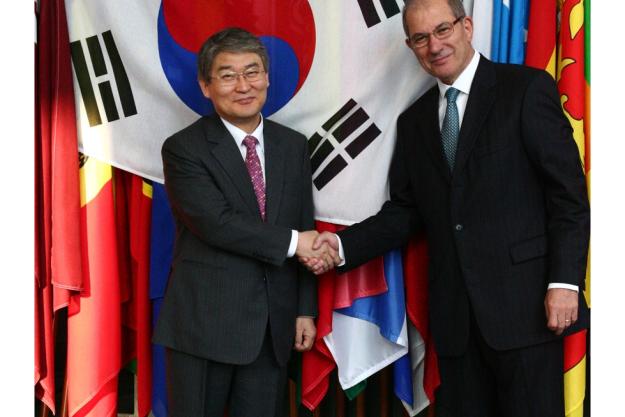
OPCW Director-General, Ambassador Ahmet Üzümcü with the Permanent Representative of the Republic of Korea, Ambassador Young-won Kim, OPCW Headquarters.
On 21 April 2011, the OPCW reached a significant milestone in the implementation of the Chemical Weapons Convention with the completion of the 2000th inspection of a declared chemical facility under Article VI of the treaty. The inspection was carried out at an industrial plant in the Republic of Korea.
Industry inspections have so far covered over 1,500 facilities in more than 80 countries. In all cases, the OPCW has been able to verify the activities declared by the States Parties.
“Industry inspections constitute a key element of the chemical weapons convention and an essential supplement to States Parties’ own measures to monitor their chemical industries” said OPCW Director-General Ahmet Üzümcü. “This milestone achievement is a tribute to the dedication of our inspectors, and to the active collaboration of our States Parties and their chemical industries.”
The Director-General added that “OPCW inspections are today accepted as a norm in the global chemical industry, and this contributes significantly to the confidence among States Parties in our verification regime. They also help raise awareness about the potential security risks involved.”
The Permanent Representative of the Republic of Korea, Ambassador Young-won Kim, welcomed the announcement and underlined the value of the continuing cooperation between the Republic of Korea and the OPCW.
____________________________________________________________________________
Under Article VI, States Parties “shall adopt the necessary measures to ensure that toxic chemicals and their precursors are only developed, produced, otherwise acquired, retained, transferred, or used” for purposes not prohibited under the Convention. Trade of these chemicals is allowed among member states only.
Toxic chemicals are used for a variety of peaceful purposes from making ink to producing pharmaceuticals. To allow for verification, States Parties declare legitimate activities involving scheduled chemicals (chemicals that have been used as warfare agents or to make such agents in the past). The OPCW verifies such declarations through a combination of data monitoring and on-site inspections without “undue intrusion into the State Party’s chemical activities”.
For more information about Scheduled chemicals and the OPCW’s verification regime, please visit our website at www.opcw.org.
